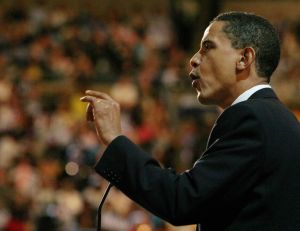Superdelegate
By Kevin Robinson in News on Jan 29, 2008 3:11PM
 With this year's presidential primaries perhaps the most exciting in recent memory, the media, and the nation, have paid very little attention to today's Democratic primary in Florida. Unlike the Republicans, who will let half of the state's delegates vote at the convention, the Democrats stripped Florida of its delegates to the August convention for holding a primary earlier than party rules allowed. As part of the party's castigation of the state, Democrats have agreed not to campaign in Florida, an agreement that has been honored until now.
With this year's presidential primaries perhaps the most exciting in recent memory, the media, and the nation, have paid very little attention to today's Democratic primary in Florida. Unlike the Republicans, who will let half of the state's delegates vote at the convention, the Democrats stripped Florida of its delegates to the August convention for holding a primary earlier than party rules allowed. As part of the party's castigation of the state, Democrats have agreed not to campaign in Florida, an agreement that has been honored until now.
After her devastating loss in South Carolina, Hillary Clinton began campaigning in earnest in Florida this week. Clinton, together with state party leadership, is calling on the national party to seat the Michigan and Florida delegates at the convention. "I know other campaigns have tried to downplay the significance of these two states," Clinton said Friday in South Carolina. "I think that is not a good strategy for Democrats or any of us who cares about the outcome of this election." She's also apparently violated the agreement not to campaign in Florida, stopping to meet voters in Sarasota and answer reporter's questions. “I just wanted to say hello to a few people who were nice enough to wait for me,” she told the press there.
So why all the ruckus over Florida? Why does today's vote matter so much? A lot of it has to do with the arcane and deeply political rules that govern the Democratic Party's nominating convention this summer in Denver.
Unlike the Electoral College, the Democratic Primaries are not winner-takes-all. Instead, they work on a proportional representation model. That is, each candidate wins state delegates roughly equal to the proportion of the vote that they get there. So while Barack Obama holds the lead in delegates earned in primary voting - 63 to 48 - Hillary Clinton holds the lead in total delegates - 250 to 152. That number includes delegates won in state primaries, as well as superdelegates. Superdelegates first came into being in the 1970s, after control of the Democratic Party nominating process essentially moved into the hands of party officials, away from the primary and caucus process. This was intended to afford some control over the nominating process to the people that had played significant roles in previous campaigns. Regular delegates are committed to vote for the candidate that sent them to the convention; superdelegates have no commitments. They can support whichever candidate they feel will best represent the party in the general election. Adding to the intrigue is the fact that someone who has no hope of winning the nomination (John Edwards) can move his delegates over to the candidate that he supports. Edwards has made it clear that he won't be backing Hillary, and with 26 delegates before Super Duper Tuesday (and more to come), he could hold the keys to the nomination.
This year, there are 796 superdelegates, and while the final number isn't set until March 1, all Democratic members of the US Congress, members of the Democratic National Committee, state governors, and other sundry elected officials will be part of that group. This is why Ted Kennedy's endorsement of Obama is significant.Think of the national convention in terms of Chicago clout: when a party player like Ted Kennedy throws his support behind a candidate like Obama, he takes a lot of other, less powerful Democrats with him. That means more people on the ground working for his campaign, and more clout at the convention, and therefore a better chance of winning the nomination in a close primary election season.
While the national party has tried to marginalize both Michigan and Florida for holding early primaries against party rules, the fact of the matter is that it is highly unlikely that Democrats will hold a convention without delegates from two decisive states, each of which played a role in the last two presidential elections. In each presidential primary since 1984 no candidate has remained viable going into Super Tuesday. This year there are two, with a potential kingmaker in John Edwards. Whether Clinton gets any momentum out of today's vote remains to be seen. What is clear, however, is that this primary season will be one of the most closely contested in at least a generation.